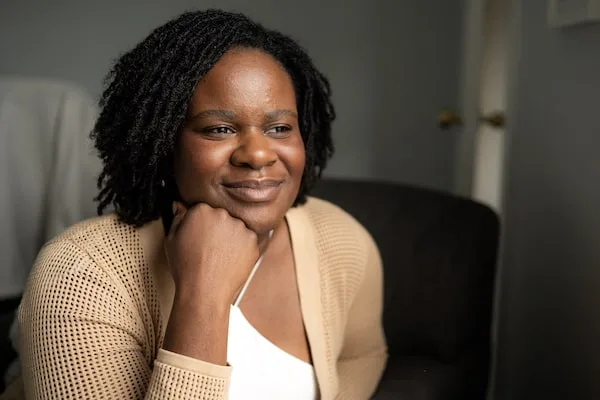
OTTAWA — Myriam Georges-Estigène, an Ottawa based psychotherapist, at her office space, Saturday, October 21, 2023.
Photo by Ashley Fraser, The Globe and MailAshley Fraser/The Globe and Mail
Despite completing a master’s degree in clinical psychology two years ago, Myriam Georges-Estigène was struggling to find permanent work. So in April, she decided to take matters into her own hands and start her own clinic.
To help get the word out, Ms. Georges-Estigène, an Ottawa-based Black psychotherapist, listed her private practice, Peace by Piece Counselling and Psychotherapy, on the Black Healthcare Professional Network’s directory. This public database of Black doctors and health care professionals is new from the BHPN, a non-profit that was formed to help such individuals navigate the cumbersome world of entrepreneurship.
“I was starting to give up on counselling,” Ms. Georges-Estigène said. Starting her own clinic “was my last hope of staying in the field.”
A February report from Statistics Canada found that Black people often turn to entrepreneurship to deal with a labour market that systemically works against them. The unemployment rate among Black Canadians was 14.3 per cent in 2021, nearly double that of their white counterparts (9.5 per cent), the study found.
Dr. Nikolai Whyte, co-founder and managing director of BHPN, said that with the platform, he hopes to help bridge the gap between Black health-care professionals and patients. In January, Dr. Whyte had started his latest cosmetic, aesthetic and medical clinic, Vivacity Medical, and wanted to use his knowledge of building a business to help others like him.
Dr. Whyte describes a hunger he has had for business since he was a child, when he would ride a makeshift Dickie Dee bike selling ice cream around his neighbourhood in Oakville, Ont.
“Many of us have that drive, but entrepreneurship is not taught at medical school,” he said.
In an update this month on major Canadian lending programs for Black entrepreneurs, The Globe and Mail reported that millions in loans have been approved to reduce barriers for them. Ottawa has approved around $35.1-million so far, and the Canadian Imperial Bank of Commerce has approved $8.5-million in loans and grants.
To launch BHPN in 2021, Dr. Whyte and co-founder Adena Addo had received funding from the Black Entrepreneurship Program’s Ecosystem Fund. The program is a partnership between the Government of Canada, Black-led business organizations such as the Federation of African Canadian Economics and Canadian banks.
Part of BHPN’s ethos mirrors that of the non-profit from which it was spun off: Aspire for Higher, which was founded by Ms. Addo in 2013 and runs youth leagues and summer camps. What the two organizations share is the use of mentorship, leadership and capacity-building programs to help members of the Black community achieve success – Aspire for Higher for Black youth and BHPN for Black health-care practitioners.
In September, BHPN launched its directory to help promote Black doctors. The first of its kind in Canada, the database allows people to connect with verified Black health-care professionals in all fields including pharmacists, nurses, dentists and psychotherapists.
BHPN points to research from the Association of American Medical Colleges that demonstrates that Black patients had better health outcomes with doctors of the same race.
“But first, we need Black health-care providers to succeed,” Dr. Whyte said.
Beyond the directory, BHPN provides Black health-care entrepreneurs with a suite of services to ideate, begin and grow their businesses.
Part of that portfolio of resources is the Business Advisory Services Program, a program began by the BHPN that helps Black health-care professionals who want to begin their own practice with tangible steps and resources to achieving their goal. Participants are paired with successful Black entrepreneurs working in the health-care space.
Ms. Georges-Estigen, the psychotherapist, first got involved with BHPN in September, when she was looking to rebrand her Ottawa-based practice. Besides Piece by Peace, she also started Thoughtful Therapist, a mental-health platform dedicated to marginalized communities. The platform gives people information about trauma-informed care and practical tips on mental-health maintenance from a registered psychotherapist.
“When I got involved with the BHPN, I was trying to grow my private practice and online platform, which was overwhelming,” she said.
Ms. Georges-Estigène worked with Nemi Adoki, the in-house business adviser at BHPN. He provides members at any stage of their business venture with resources such as connections to financial advisers and auditing firms, and can provide help with writing business plans.
Before she met with Mr. Adoki, Ms. Georges-Estigène had already applied for and secured a grant through the Michaelle Jean Foundation, an Ottawa-based charity that funds racial-justice initiatives by youth (aged 17 to 30) for her Thoughtful Therapist platform.
“He is helping me apply for other grants and funding, but he has also helped me figure out what to do with the funding I already received,” she said.
Moving forward, Ms. Addo says the goal for BHPN is to get 100 Black health-care professionals to start their own business.
“In the past two years, we’ve been able to get more than halfway there,” Dr. Whyte noted.


